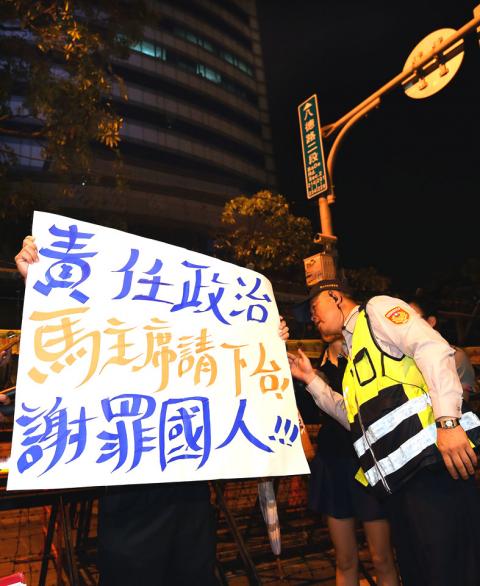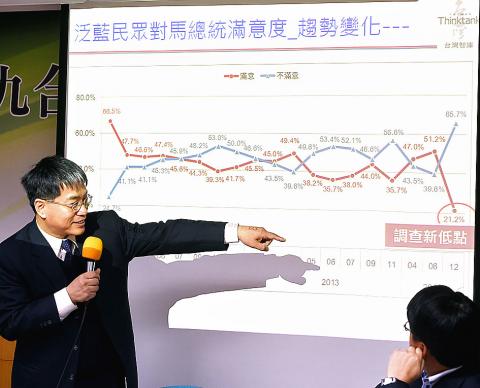One of the main reasons behind the Chinese Nationalist Party’s (KMT) disastrous defeat in the nine-in-one elections on Saturday last week is the public’s strong disapproval of President Ma Ying-jeou (馬英九) and Premier Jiang Yi-huah’s (江宜樺) performances, particularly among the younger generation, a Taiwan Thinktank survey said yesterday.
The telephone-based poll was conducted among 1,069 Taiwanese older than 20 on Sunday and Monday to gauge voting behavior in the nation’s largest-ever local elections.
The survey found that more than 74 percent of respondents are dissatisfied with Ma’s performance as president, up from 66.8 percent recorded in a similar poll conducted by the think tank in June. It also found that Ma’s approval rating sank to just 9.7 percent from 21.7 percent in June, with just 5.7 percent of people aged between 20 and 29 saying they are satisfied with Ma’s work over the past six years.

Photo: Chien Jung-fong, Taipei Times
Jiang received nearly the same approval rating from respondents in that age group — 9.8 percent — far lower than the average figure of 14.2 percent given by all those surveyed.
David Huang (黃偉峰), an assistant research fellow at Academia Sinica’s Institute of European and American Studies, said youth turnout had been about 60 percent in previous elections, but increased to 74 percent in Saturday’s polls.
“The increase is particularly meaningful when compared with the overall voter turnout of 67.5 percent. Who those extra 14 percent of young people voted for and whether they decided to participate in the election as a form of protest against the Ma administration are questions worth exploring,” Huang told a press conference held to release the poll results in Taipei.

Photo: Fang Pin-chao, Taipei Times
Huang said that while about 64 percent of the survey participants said they made up their minds about which candidate to back based on information from television news shows, the percentage of people consulting content on news and social networking sites increased.
Taiwan Thinktank deputy chief executive Lai I-chung (賴怡忠) said the elections were apparently a vote of no confidence in the Ma administration, citing the 25.1 percent of respondents who said their discontent with the central government was an important factor in their decision at polling stations.
“It is also worth noting that nearly 53 percent of those polled attribute the KMT’s defeat in the local elections to the public’s disapproval of [what are perceived as] the Ma administration’s China-leaning and corporation-centered policies, with about 51 percent saying it would take more than Ma stepping down as KMT chairman for the party to regain public support,” Lai said.
Lai said the election results also signify the end of the KMT’s traditional campaigning methods, as evidenced by the 63.5 percent of respondents who said they found ineffective the party’s threat that a victory by independent Taipei mayoral candidate Ko Wen-je (柯文哲) would destroy the Republic of China.
Nearly 64 percent of respondents said the public frenzy over Ko has made them more willing to consider voting for independent candidates in the future, the survey showed. Sixty-nine percent said the election results will be conducive to Taiwan’s democracy, while 46.4 percent think they will benefit the nation’s economy.

Tropical Storm Gaemi strengthened into a typhoon at 2pm yesterday, and could make landfall in Yilan County tomorrow, the Central Weather Administration (CWA) said yesterday. The agency was scheduled to issue a sea warning at 11:30pm yesterday, and could issue a land warning later today. Gaemi was moving north-northwest at 4kph, carrying maximum sustained winds near its center of up to 118.8kph and gusts of 154.8kph. The circumference is forecast to reach eastern Taiwan tomorrow morning, with the center making landfall in Yilan County later that night before departing from the north coast, CWA weather forecaster Kuan Shin-ping (官欣平) said yesterday. Uncertainty remains and

SEA WARNING LIKELY: The storm, named Gaemi, could become a moderate typhoon on Wednesday or Thursday, with the Taipei City Government preparing for flooding A tropical depression east of the Philippines developed into a tropical storm named Gaemi at 2pm yesterday, and was moving toward eastern Taiwan, the Central Weather Administration (CWA) said. Gaemi could begin to affect Taiwan proper on Tuesday, lasting until Friday, and could develop into a moderate typhoon on Wednesday or Thursday, it said. A sea warning for Gaemi could be issued as early as Tuesday morning, it added. Gaemi, the third tropical storm in the Pacific Ocean this typhoon season, is projected to begin moving northwest today, and be closest to Taiwan on Wednesday or Thursday, the agency said. Today, there would likely

DISRUPTIONS: The high-speed rail is to operate as normal, while several airlines either canceled flights or announced early departures or late arrivals Schools and offices in 15 cities and counties are to be closed today due to Typhoon Gaemi, local governments announced last night. The 15 are: Taipei, New Taipei City, Taoyuan, Tainan, Keelung, Hsinchu and Kaohsiung, as well as Yilan, Hualien, Hsinchu, Miaoli, Chiayi, Pingtung, Penghu and Lienchiang counties. People should brace for torrential rainfall brought by the storm, with its center forecast to make landfall on the east coast between tonight and tomorrow morning, the Central Weather Administration (CWA) said. The agency issued a sea warning for the typhoon at 11:30pm on Monday, followed by a land warning at 11:30am yesterday. As of

CASUALTY: A 70-year-old woman was killed by a falling tree in Kaohsiung as the premier warned all government agencies to remain on high alert for the next 24 hours Schools and offices nationwide are to be closed for a second day today as Typhoon Gaemi crosses over the nation, bringing torrential rain and whipping winds. Gaemi was forecast to make landfall late last night. From Tuesday night, its outer band brought substantial rainfall and strong winds to the nation. As of 6:15pm last night, the typhoon’s center was 20km southeast of Hualien County, Central Weather Administration (CWA) data showed. It was moving at 19kph and had a radius of 250km. As of 3pm yesterday, one woman had died, while 58 people were injured, the Central Emergency Operation Center said. The 70-year-old